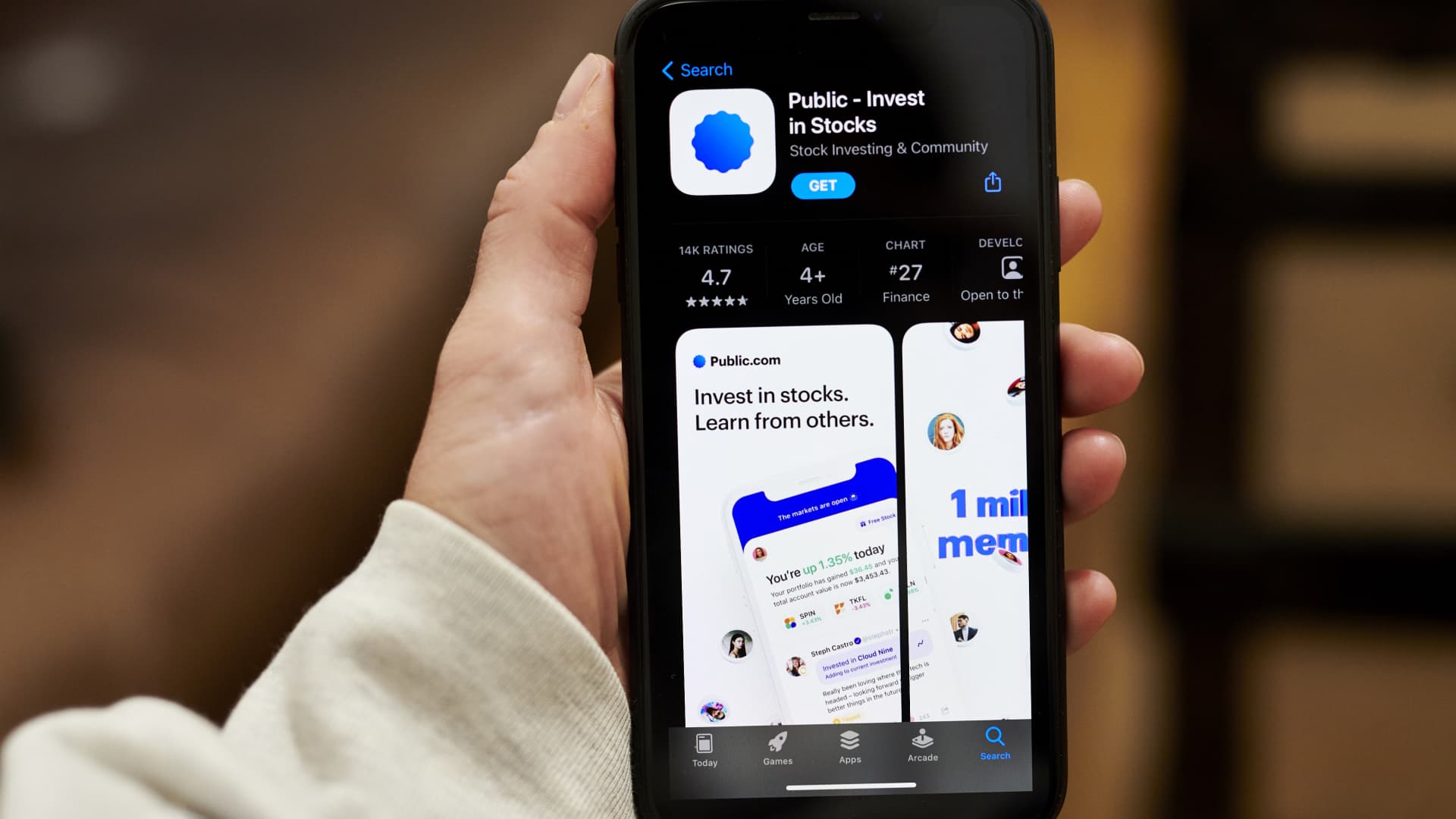American stock brokerage startup Public launched its services in the U.K. Thursday, marking its first international expansion its launch in 2017.
The app, backed by celebrities including Will Smith and skateboarding legend Tony Hawk, will offer U.K. users commission-free trading in over 5,000 U.S.-listed stocks during the country’s regular trading hours.
Public hopes to broaden its U.K. offering over time to include other asset classes already available in the U.S., such as ETFs, U.S. government bonds, and cryptoassets. The company also plans to launch an “investment plans” tool in the future that lets users come up with customized recurring investments.
Public’s U.K. debut will see it compete with a flurry of well-established digital brokerage firms like AJ Bell and Hargreaves Lansdown, which make money from commission charges and management fees, as well as upstarts such as Revolut, Freetrade and eToro, where revenue comes mainly from subscriptions and other fees.
It is a heavily congested market — but Leif Abraham, Public’s co-CEO, touted the company’s lower foreign exchange fees as one element separating it from the pack in the U.K.
“Most of our competitors in the U.K. will charge currency conversion fees on every single trade,” Abraham told CNBC in an interview. “We only do it with the money deposited, and our fees are going to be dramatically lower than most of our competitors.”
Public will charge 30 basis points, or 0.3%, on each deposit to convert British pounds into U.S. dollars.
The firm has European roots, having been founded in September 2019 by Jannick Malling and Abraham, from Denmark and Germany, respectively, who now serve as co-CEOs.
The platform, which lets people build portfolios and invest in stocks and cryptocurrency, hit more than 1 million users in 2021.
It benefited significantly from the GameStop saga of early 2021, which saw the share price of the U.S. game retailer and other heavily-shorted companies skyrocket on the back of buzz from an online community of investors.
The period shone a light on the controversial “Payment for Order Flow” (PFOF) practice, where brokerages are paid by market makers like Citadel Securities to route customer orders to the firm.
In 2021, Public removed PFOF from its platform, concerned it was driving customers to unhealthy day trading habits. It also added “safety labels” to certain stocks to inform users when certain companies are facing heightened bouts of volatility or the risk of bankruptcy.
PFOF is already banned in the U.K., while the European Union is planning to follow suit with its own prohibition of the practice.
Public has gone down the route of partnering with a firm that is already regulated to provide its services in the U.K., rather than apply for its own license. “A ton of fintechs have gone through this route,” Dann Bibas, the company’s head of international, told CNBC.
Public will operate in the U.K. as an appointed representative of Khepri Advisers Limited, which is authorized and regulated by the Financial Conduct Authority.
Bibas said that, for now, the U.K. is the only country Public is focusing on for its international expansion. In the future, it hopes to take learnings from its U.K. launch to open in other European markets. Public has offices in New York, Copenhagen, London, and Amsterdam.
Tough market conditions
Online brokerage platforms have had a tough time lately. The rising cost of living has made it tougher for consumers to part with the cash they were flush with during the days of Covid.
Freetrade, the U.K. brokerage startup, slashed its valuation by a whopping 65% last month to £225m in a crowdfunding round, citing a “different market environment.”
Abraham said Public didn’t face the same problems facing many retail brokerage apps, which have been left facing a funding crunch due to a rise in interest rates.
“We have a very healthy cash balance,” Abraham said. “Hence why we can do things like expanding into the U.K., the U.S., and so on.”
Public, he said, saw no reason to raise cash at this stage. It has already raised $300 million from investors including Accel, Greycroft and Tiger Global. The company was last valued at $1.2 billion, giving it coveted “unicorn” status.
Abraham said that higher interest rates have actually benefited Public to some extent, as it is earning yields on the cash customers deposit and seeing increased interest in other assets such as U.S. Treasurys.
Can Public succeed where others have failed?
Public is hoping to avoid the fate of its U.S. peer Robinhood, which abandoned its U.K. operation in 2020 to prioritize its home market. Abraham said he’s convinced this won’t happen in Public’s case.
“We don’t have to reinvent our business model in order to enter a new market,” he told CNBC.
“It’s not like – to take the other extreme – like the last-mile delivery company, where you have to now have a massive footprint,” Abraham added. “We can actually expand in other markets with a fairly lean team that’s responsible for that.”
Robinhood does have plans to reenter the U.K., however – it is set to launch in the country at some point in the near future following its acquisition of cryptocurrency trading app Ziglu last year.


